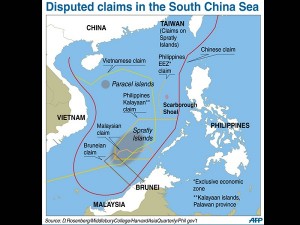Military elated by US promise of radar system
MANILA, Philippines—The Philippine military expressed pleasure Thursday at the plan of the US government to provide the country with a powerful radar system that could help deter territorial intrusions in the face of a dispute with China over territories in the West Philippine Sea (South China Sea).
The Armed Forces of the Philippines said the announcement of the US government to assist the Philippines in monitoring coastal waters would help the latter form a “minimum credible defense posture” against potential threats.
“This significant development comes at a very opportune time as we try to beef up our defense capability particularly in bolstering our maritime surveillance and monitoring capabilities,” said AFP public affairs chief Colonel Arnulfo Marcelo Burgos Jr.
He added that “this effort will not only help us prevent foreign intrusion but will also aid us in addressing transnational crimes like poaching, human trafficking, piracy and drug trafficking.”
On Tuesday, a Pentagon spokesperson announced plans by the US military to provide the Philippines a powerful land-based radar system to form part of a “watch center” that would be able to track ships off the archipelago’s coastline.
“This center will improve the Philippine maritime domain awareness of a breadth of security issues including countering the proliferation of WMD (weapons of mass destruction) to countering illegal smuggling,” Major Catherine Wilkinson told a news agency.
Article continues after this advertisementThe Philippines has sought military assistance from the United States to boost its position in its long-running standoff with China over Panatag Shoal, internationally known as Scarborough.
Article continues after this advertisementIn April tensions rose between the two countries over disputed fishing grounds in Scarborough Shoal when Philippine authorities tried to arrest alleged Chinese poachers, driving Chinese maritime vessels to step in.
The standoff continued well into May with maritime ships from both sides coming and going into the area as a show of force, while the Department of Foreign Affairs and its Chinese counterpart sought a diplomatic resolution.
Meanwhile, a militant leftist organization denounced the plan of the United States to establish a maritime surveillance system in the Philippines, saying the former only wished to set up its own “spy base” to protect its interests in the region.
The umbrella group Bagong Alyansang Makabayan (Bayan) said the US had long been pushing for a monitoring and surveillance system “to allow it to have control over vital sea lanes such as the South China Sea.”
“If the plan pushes through, the US will have set up its own spy base on PH territory, disguised as a coast watch center, and in clear violation of Philippine sovereignty,” Bayan secretary general Renato Reyes Jr. said in a statement.
He said the idea of a maritime surveillance system in the Asia-Pacific region had been proposed as early as the presidency of Gloria Macapagal-Arroyyo with Kristie Kenney as US ambassador.
Reyes cited a diplomatic cable dated August 27, 2007, which was among the hundreds of thousands of US memos around the world leaked by the whistle-blower Web site Wikileaks.
In that cable, Reyes said the US embassy in Manila proposed an elaborate regional surveillance network both land- and sea-based to further advance US maritime security efforts.
“Our proposal emphasizes the installation of land-based and sea-based maritime radars and other types of surveillance and identification equipment in the tri-border area of Malaysia, Indonesia, and the Philippines and other key points between Sri Lanka and the Philippines to monitor vessels suspected of carrying terrorists, weapons, or drugs, as well as engaging in human trafficking and other illegal activities”, the cable read in part.
Reyes said it was clear from the cable that “US strategic interests were paramount when it comes to the issue of regional security.”
